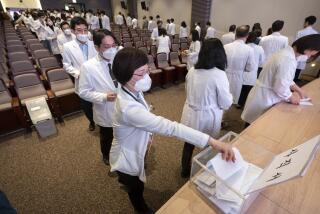Cambodian Health Care Still Critical
- Share via
PHNOM PENH, Cambodia — When 18-year-old Sos Kun was taken to a public hospital recently with a bullet in her spine, surgeons and nurses in the emergency ward paid no attention.
They wanted $140 up front before doing anything.
“I held the hand of one of the nurses and begged for help,” said Yan Kong, the girl’s mother. “I told them the money is on the way, but please do something or she will die. But they did nothing.”
Sos Kun’s mother couldn’t meet the demanded fee, which was about half the annual average income in this desperately poor country. But her daughter had a bit of luck--she was wounded as a bystander in a high-profile political murder, and human-rights activists put up the cash.
Tales of withheld medical care are commonplace in Cambodia, where underpaid doctors often treat patients, especially the poor, with contempt.
Cambodian physicians have been accused of openly disdaining patients, particularly city doctors in their dealings with rural peasants.
Such reputed arrogance may have made doctors a special target during the bloody 1975-79 rule of the Khmer Rouge peasant revolutionaries. Only 30 of Cambodia’s 600 doctors were alive by the time the Vietnamese army drove the Khmer Rouge from power.
Aside from training new medical professionals--with a focus on quantity, not quality--little was done to rebuild the health sector during the decade-long Vietnamese occupation that followed.
A new chapter opened in 1993, when the United Nations organized elections that opened Cambodia to the outside world for the first time in two decades.
Some 400 humanitarian groups lined up to help rebuild Cambodian society. About a quarter were involved in health, setting up clinics and running some training programs, but they had little success in getting the government to expand and improve the delivery of health care.
Earning less than $20 a month in public hospitals, doctors and nurses seek extra income in private practice. Public hospitals are little more than waiting rooms for their private activities.
They are willing to do almost anything to earn fees, critics say, even prescribe unneeded, and sometimes unhealthy, treatments for patients who have money.
Part of the problem is that efforts by international aid groups have fallen short of ambitions to build a civil society in a country hardened to suffering by genocide and war.
But the biggest obstacle to health sector improvements appears to be a lack of political will. Only 6% of the 1998 national budget goes to the Health Ministry, compared to 32% to the Interior and Defense ministries, both of which are involved in security matters.
Arguing that Cambodia’s civil war is almost over after big government victories over the remnants of the Khmer Rouge, aid groups say it is time to address society’s other needs.
“It is very easy to say health care reform, but it is difficult to implement,” said Mean Chhi Vun, deputy director of health.
In the health sector, as in other areas of government, leaders have refused to cut deadwood on overstaffed state payrolls to free up money for higher salaries. Providing jobs is seen as a way to keep social peace in a country with few economic opportunities.
Meanwhile, money earmarked for health services on the provincial level goes through a circuitous path from the Finance Ministry to the offices of provincial governors. Only half reaches health facilities.
“Virtually everybody in the Ministry of Health is very unhappy with this,” said Maurits van Pelt of the medical aid group Doctors Without Borders.
But following the bloody coup that gave him sole power nearly a year ago, Cambodia’s leader, Hun Sen, needs to pay for the support of provincial governors, who are often little more than warlords.
Foreign governmental assistance to Cambodia has leveled off since 1993. Declines are likely to continue as long as the government ignores the concerns of donors, such as the need to make economic and fiscal reforms and to respect human rights.
In reaction, Hun Sen’s government has clamored for increased help from humanitarian groups.
MEDICAM, an umbrella organization for health aid groups, says they won’t do more as long as budget cuts hit the activities of social welfare agencies more than the security ministries.
More to Read
Sign up for Essential California
The most important California stories and recommendations in your inbox every morning.
You may occasionally receive promotional content from the Los Angeles Times.













